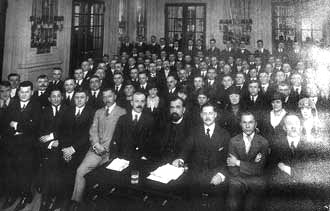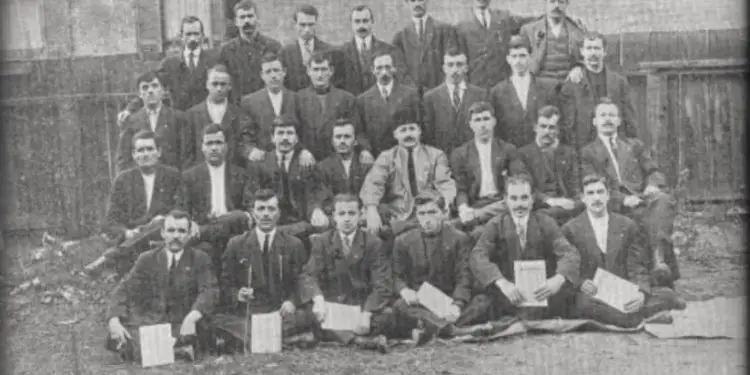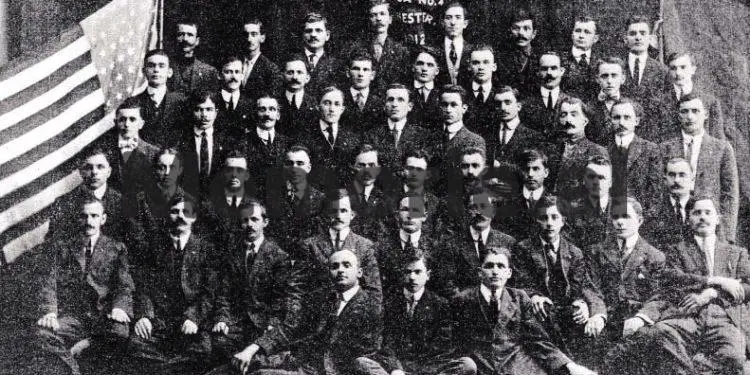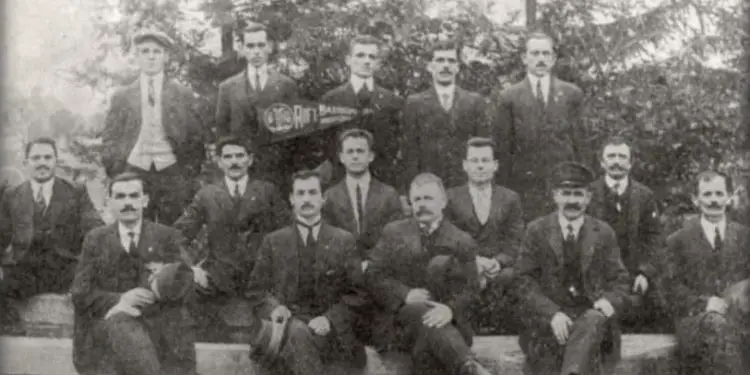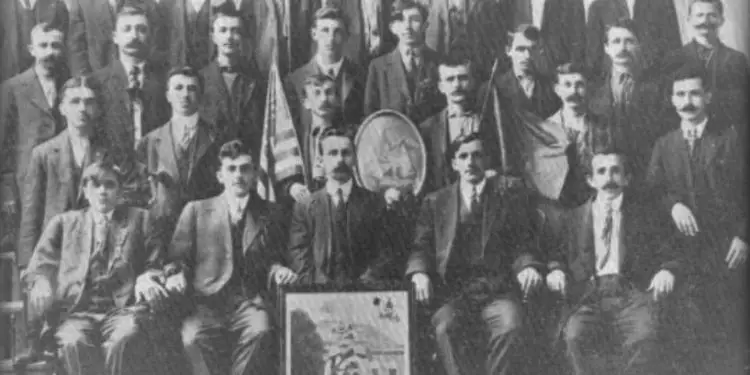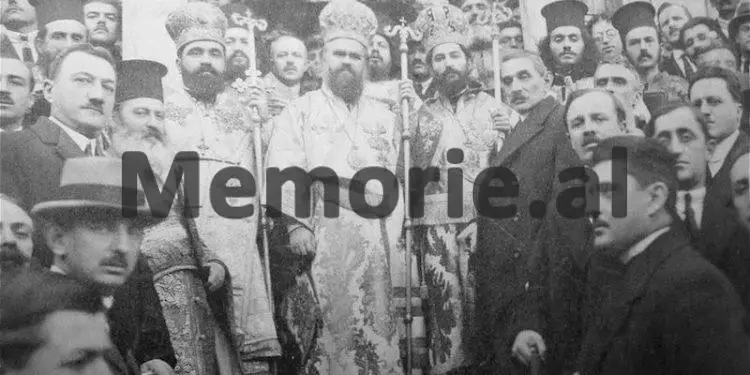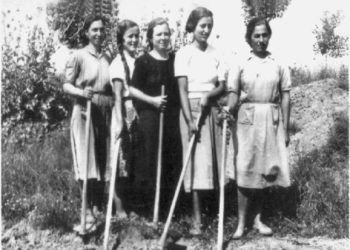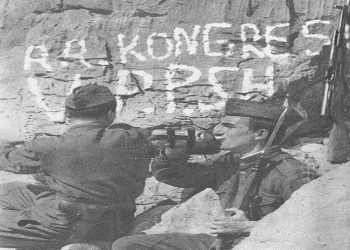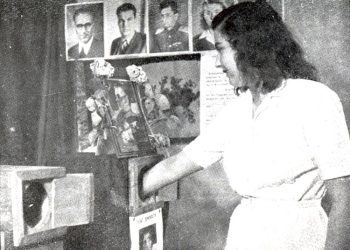Memorie.al / Exactly 15 years ago today, according to his own last wishes, the ashes of Prof. Peter Prifti were scattered in the waters of the Erzen River. He was a scholar and author of books and writings, a distinguished activist and figure in the Albanian community in America. His studies and writings directly helped the cause of Kosovo and Albanians in the former Yugoslavia and the Albanian world in general. A matchless gentleman and an honorary board member of the “Illyria” newspaper, he was a friend to us and always ready and attentive to any need we had. He was the brother of the well-known Albanian writer Naum Prifti, from whom he was separated only to meet again after nearly 50 years, due to Albania’s isolation under the communist regime. On this occasion, we are re-publishing the interview he gave to Vehbi Bajrami for the “Illyria” newspaper, published in the book “Albanians of America,” where he talks about his life, his acquaintance and cooperation with Fan Noli, etc. May the memory of Prof. Peter Prifti be eternal?
While I was getting ready to talk with Peter R. Prifti in San Diego (California), my gaze was drawn to the shelves of his room filled with books. I immediately recalled an aphorism by Cicero: “Books are the nourishment of youth, the pastime of old age, the ornament of advancement, a shield and refuge in difficulty, a light in a dark house, companions by day, by night, in sentiment, and on a journey.”
I remembered the many visits and meetings with Albanians in America, some of whom were very wealthy, in whose rooms not a single book could be found. (Cicero said: “A house without books is like a body without a soul.”) How many books, I repeated to myself, I don’t know for the umpteenth time, mixed with simultaneous pleasure and despair. Why don’t we have more Albanian men and women of the pen here in America like this man to whom I am dedicating these modest lines, the author and co-author of all those works, studies, communiqués, and articles?
When 15-year-old Prifti came to America from Rehova e Kolonjës, a village at the foot of Mount Gramoz, he did not share the same mindset as many of his peers, whose primary goal was material gain – how to get rich as quickly as possible. Since he was an elementary school student in the village, or at the Erseka boarding school, the great desire to read and write took root in Prifti. From his early youth, he took the first step by recording in his small notebook the names of places, birds, village games, and so on.
From what he had read when he was young, he particularly liked Asdreni’s poems, especially those about the seasons. He had memorized many of them and recited them with passion. The young boy liked the subject of geography the most, because it introduced him to the “big and strange world, beyond the narrow horizon of Kolonja.” This fervent desire to know the world was like a premonition of his future, as he would take the long road to the new continent across the ocean as a young man, where he would spend the majority of his life with a book and a pen in hand.
His first teacher, Kostë Cere, had just returned from America, the country where Prifti would emigrate after finishing primary school, to meet his father and brother. Two years before taking the long journey by ship, he saw Korça for the first time, the city “with electric lights and wide boulevards, with streets full of people, with monuments, with a cinema, with ‘tall’ hotels with 3-4 floors.”
“No city in the world, neither Bari, nor Naples, nor New York, impressed me as much as Korça,” says Prifti, whose pastoral life in the village “had its own dramas, but which was generally a simple and secluded life.” Peter R. Prifti came to Philadelphia in March 1940, where his father Rafaili and older brother Toli lived. His grandmother, mother Parashqevi, younger brother Naumi, and sister Elisaveta remained in their birthplace. “It was a painful separation,” affirms Prifti. “I was not enthusiastic about coming to America.”
In Korça there is a square which they call “Lëndina e Lotëve” (The Meadow of Tears), a toponym that expresses the entire human tragedy of that area and the surrounding regions. It was precisely there that the seasonal workers took tearful farewells from their homeland. It was a time of war. Many external roads were closed. But even when the Second World War ended, the communist government of Albania, unlike other countries in the world that were reopening the roads closed by the war, erected “a second wall,” the Iron Curtain.
Many people were separated never to meet again. Prifti and his family shared this fate. The Italian steamer on which he traveled was the second to last from Albania to cross the Atlantic during the War. About his first and longest journey by ship, Prifti says it was very difficult, as “I got seasick” and thought “I would not arrive alive in New York.”
“Imagine: to move from a backward country and suddenly find you in an extraordinarily developed country; to cross from the provincial life of the village to the cosmopolitan life of a giant city like Philadelphia! You are bound to be confused. The way of life in the new world seemed abnormal, shallow, futile, and as such, it immensely disturbed me,” recalls Peter. It took a long time before he “reconciled” and “befriended” America. On the other hand, America was astonishing to Prifti with its advanced culture, with the classical works of music, painting and sculpture, literature, theater, etc.
“It was like a spiritual and mental adventure, with incalculable values. Can you imagine what it means to become familiar with the music of Puccini and Beethoven, with the works of Dostoevsky, Tolstoy, and Molière, with the paintings of geniuses like Van Gogh, Renoir, and Tintoretto in 2-3 years?” he confesses. The new reality was a fulfillment of his great youthful thirst for knowledge and culture.
His father, Rafaili, a lover of education, understood his son’s desire and spared no expense in financing his schooling. He even felt proud when he saw his son’s passion for knowledge. “The Albanian of my generation, when he came to America, was ‘a piece of meat with two eyes’,” he told his children one day, “Moreover, he didn’t even know English.” Since he did not want his sons to struggle as he had, he sent them to school.
Peter Prifti’s father had a rare character. He had come to America back in 1916. Initially, like all other immigrants, he did hard work on a railroad and then in restaurants, until he opened his own restaurant. Prifti finished high school in 1944. Then he enrolled at “Pennsylvania State College,” where he focused more on “liberal arts”: linguistics, literature, history, psychology, political science, etc.
After four years, he graduated with a “bachelor of arts.” “This school,” he recalls, “had a beautiful landscape around it ‘which resembled the nature of Kolonja and somewhat eased my longing for the village where I grew up’.” He continued his studies at the “University of Pennsylvania,” one of the most famous universities in America, founded in 1740. His goal was to deepen his studies in philosophy. In 1955 he earned a “Master of Arts” degree in this field.
“Philosophy enriched my mind and soul,” says Prifti, “but not my pocket, because I could not use it to earn a living. I made a living with other jobs. Perhaps this is an irony of my life.” Ten years after receiving his “Master of Arts” degree, Peter Prifti went to Paris to master the French language at the school “L’Alliance Française” where there were students from all over the world. “Since I did not make a career in philosophical studies,” he says, “I had to take any job at first. For two years, 1955-57, I worked in the office of a railroad company in Baltimore, near Washington.” “This job is not for you,” a colleague told me one day. You are capable of better work.”
Three years later, he found a more suitable job. The President of the “Vatra” Federation, Kristo Thanasi, invited him to work as an editor for the newspaper “Dielli” (The Sun) along with Qerim Panariti and as secretary of the Federation. Prifti, who had started collaborating with “Dielli” since the 4th decade (1940s), accepted this invitation with pleasure, because “Vatra” and “Dielli” had great prestige in the community. This was also for another reason: the great Fan Noli was still living in Boston at that time. By working there, he would have the opportunity to meet and talk with him, to listen to him during mass at “St. George’s Cathedral,” or when he spoke at the feasts and dinners held by Albanians. In fact, the first interview Prifti conducted for “Dielli” was precisely with Bishop Noli.
When he asked Bishop Noli what his most valuable activity for the nation was, he had replied: “The work I did for the admission of Albania to the League of Nations in 1920.” To the question: “What had most disappointed him in life,” Noli had said; “leaving Albania, because this departure put an end to my work within the homeland.” To those who thought that religion did not occupy the first place in the Bishop’s activities, he had replied: “This is not true. I started my religious career when I was a child and have continued this activity without interruption. Religion is number one for me, and then come the others.”
Working in “Vatra” gave P. Prifti the opportunity to become better acquainted with the Albanian world in America, both “with the political and religious disagreements that divided our compatriots” and “with the precious national and cultural values that Albanians proudly preserved.” In the “Dielli” newspaper, in 1958, he wrote: “The long rule of Turkey in Albania had greatly weakened national feelings among Albanians and had completely extinguished them in many people. Many of the Albanians who came to the USA did not even claim to be Albanians, but said they were Greeks or Turks. It is already known how difficult it was for Bishop Fan Noli and the other pioneers of the national movement in America to awaken national feelings in the hearts of their compatriots. They were simple people, uneducated and unskilled….”
Besides Noli and Konica, Prifti also mentions some other names that remain marked in the history of the Albanian Diaspora in America, such as Kostë Çekrezi, a capable activist who rendered valuable services to the national cause. Another honored name of the Albanian Diaspora in America, according to Prifti, is Kristo Dako, a publicist and friend of education. He collaborated closely with the Qiriazi sisters who published the magazine “Ylli i Mëngjesit” (The Morning Star), so valued among Albanians in America. Of those who are alive, he mentions Anthony Athanas, the successful businessman, who was also his close collaborator when he was editor and secretary of “Vatra.”
When talking about the role of the old Albanians of America for Albania, Prifti often affirms that we must maintain the same attitude they held for the homeland, have that love and connection, and not allow cracks and religious or regional divisions. He has written several times about the core of the Albanian Diaspora’s unity, “Vatra,” and its organ, “Dielli.” He is against those who say that “Vatra” and “Dielli” completed their mission a long time ago and are now fading away in their final days.
The “mystery” of “Vatra’s” longevity for so many years is related to the magnificent service it rendered to the homeland during the 12 years (1912-1924). With the work it did during that period, “Vatra” captured the hearts and minds of Albanians and deeply entered their soul, so deeply that neither the generation of the first immigrants who created that association nor the generations that followed years later and until today could forget it. The life of this federation is parallel to the life of modern Albania. Both are of the same age. Therefore, when recalling or discussing it, the Albanian, willingly or unwillingly, connects its name with the Albanian nation, with their place of birth or origin.
This noble feeling has prompted Albanians to keep this long-lived federation alive for more than 90 years. Regarding the newspaper “Dielli,” Prifti states that it constitutes the oldest register of the collective life of Albanians in America. Almost their entire history has been written on its pages, from the moment the first immigrant set foot to the most recent ones. This very fact connects Albanians with “Dielli” and “Vatra” in an intimate, warm way, more or less as people connect in a family, or with old, unforgettable friends and comrades. The majority of Southern Albanians who came to the USA have had an old worry: some compatriots did not side with “Vatra” and Noli, but with the Greeks.
“These Albanians, otherwise called Grekomanë (Greek-Albanians/Graecomans), were a minority,” says Prifti. “The main and healthiest part of the Albanians supported Albania, the ‘Vatra’ Federation, and Noli. They worked wholeheartedly for the Autocephalous Orthodox Church, which was founded more on a national than a religious motive. The Albanian Autocephalous Church, founded in 1908, and the Pan-Albanian Federation ‘Vatra’, formed four years later, are the two pillars that laid the foundations of the Albanian national movement in America,” he says. “But there were some Albanians who tried to remove the stones from this pyramid, which was being built on solid ground.”
The Grekomanë viewed the Greek Orthodox Church with more sympathy than the Albanian one. These people had inherited the stale ideas of some Albanians during the Ottoman Empire, who suffered from being Christians and for this they sympathized with Turkey’s enemy, Greece. Another reason is that Greek teachers and clerics were very present in Southern Albania at the beginning of this century. They spread Greek ideas among Albanians and the denial of our being. Thus, it has happened that even today some Albanians have emotional and spiritual ties with the Greeks and it seems to them that those who are not connected with the Patriarchate of Constantinople are not true Orthodox.
“What is your opinion about Archbishop Anastasios [Janullatos] who leads the Orthodox Church in Albania today?” I ask him. “I opposed it as soon as I heard that he would be at the head of our Church. It is neither in the interest of the Church nor in the interest of our nation that a foreigner leads the Albanian Orthodox Church,” says Prifti – bringing up numerous examples from our bitter historical past with the Patriarchate of Constantinople. “We know,” he adds, “that our Church was destroyed during the communist dictatorship in Albania. We should have waited a while longer, until an Albanian bishop could be found. I do not agree with the idea that our Church should be led by foreigners.”
The Albanian spirit in the Albanian Diaspora of America has been especially kept alive by the press. From 1906, when the first Albanian newspaper was published in America, until the end of the Second World War, 52 Albanian newspapers and magazines were published in the USA. After the Second World War, the number of publications was smaller. 33 newspapers and magazines have been published (until today). As is the case now, in the past too, the Albanian press has spoken more than one language. Over 30 publications have been printed in Albanian and English, and at least four of them have also published material in French and Italian.
“Like the press of other ethnic groups in America, the Albanian press, in general, aspired to improve the social, economic, educational, and political conditions of Albanians,” says Peter Prifti. “However, unlike a large part of the press of other immigrants, it resisted assimilation by American society and, on the other hand, showed restraint towards the radical and revolutionary currents of the time. In short, it avoided both extremes. If one word should be used to characterize or define the Albanian press in America,” affirms P. Prifti, “it is the word nationalism, which implies the formation and preservation of the Albanian nation.”
From the rich biography of the protagonist of this article, we note the time when he worked for 15 years at MIT (Massachusetts Institute of Technology, International Studies Sector) in Cambridge, a world-renowned institute. Most of the time there he dealt with the Albanian issue. Here, in a high intellectual environment, he began his authentic academic activity. During this time, he wrote and published studies on his homeland and on the events in Kosovo. He continued his studies on Albanian problems in San Diego, California, where he moved in 1976.
This move was related to a project of the Language Faculty of the University of California in this city for the study of the Albanian language. Prifti was invited to work there as an Albanian specialist. The work he did together with his American colleagues culminated in the publication of two books, “Spoken Albanian” in 1980 and “Standard Albanian,” published two years later, which deals with problems of Albanian language grammar, according to the principles of the unified language.
Both books were very well received by critics and readers. Peter R. Prifti, from the day he came to America, in one way or another, continuously maintained close relations with the Albanian world. When he was in Philadelphia, he ran a weekly radio program in the Albanian language (1949–’55). Throughout this time, he was constantly engaged in research and publications in the field of Albanian studies. The first place in the list of publications is occupied by the book “Socialist Albania Since 1944” which was published in 1978.
Viewing Albania in the context of political-economic developments in relation to the past, he noted in his book at that time that Albania would one day break away from the communist world, because it was historically connected with the West. Our scholar dedicated a chapter in this book to Kosovo, to show the English-speaking world that “there is Albania, but there is also Kosovo” and that “Albania and Kosovo are one.”
Many books published on Albania, Kosovo, and Eastern Europe in the last three decades in America includes chapters written by P. Prifti, on various issues, such as: international relations, ethnic conflicts, economy, military, religion, literature, and memoirs. “I have written about Kosovo more than anything else. I have a dense file,” says Prifti and adds: “Regardless of the world’s opinion on Kosovo, the best way is for it to openly declare its intention to unite with Albania, because it is part of it; it is half of the Albanian territory that was unjustly severed by the Great Powers.”
“This tragic mistake must be corrected,” he concludes. “Albanians must inhabit a united nation. They should view the future from this angle and work until the goal is achieved. As long as Albania is separated from Kosovo, it is difficult for it to exist. Ismail Qemali also said this in his time. Many others have also confirmed this,” he says.
Some of Peter Prifti’s works can be found in various encyclopedias published in America and Europe. One of these is the famous “Britannica” encyclopedia, for which he prepared an article on the history of Albania. He has also published studies, book reviews, reports, interviews, etc., in academic journals and in the Albanian press, and especially in the newspapers “Dielli,” “Liria” in Boston, and later in “Illyria” in New York. A good part of his activity is related to the translations he has done from Albanian to English, with the aim of making the literature of his homeland more widely known in the English-speaking world.
Among the most serious translations, he mentions the works of his brother, the writer Naum Prifti, and a book by Stavre Frashëri, “Përmes Mirditës në dimër” (Through Mirdita in winter). In addition to translations and studies, P. Prifti was very active in the activities of the Albanian colony in America, such as the organization of national holidays, the screening of dramas and films, and the cultivation and spread of Albanian folk culture. He has participated and spoken at many academic conferences, such as the symposium on Noli at “Harvard University” in 1982, the Conference on Kosovo in New York, that same year, etc. / Memorie.al




